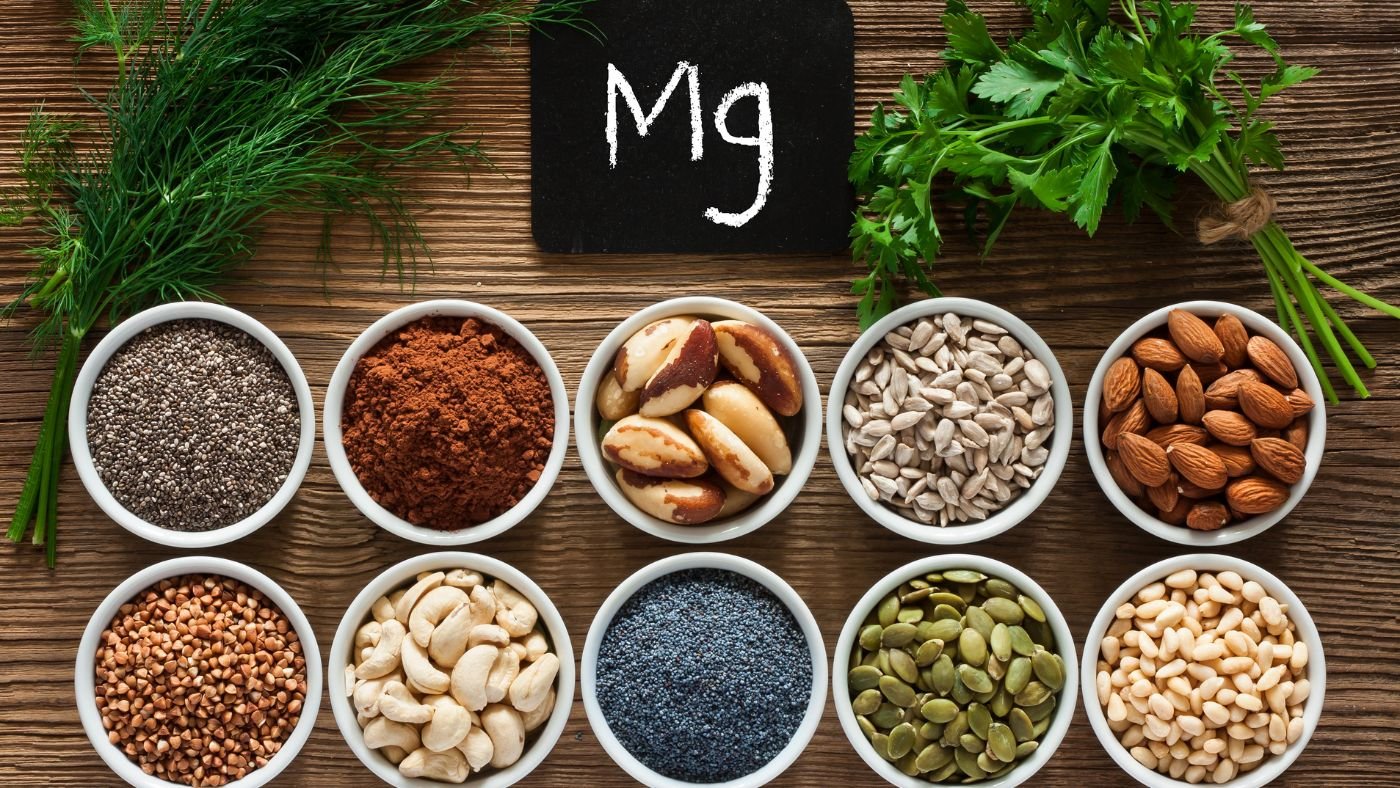Magnesium is one of the body's electrolytes, important mineral, playing a role in more than 300 enzyme reactions in the human body. It is important for muscle and nerve function, blood pressure regulation and immune system support.
Adults have about 25 grams (g) of magnesium in their bodies1, of which 50-60% of magnesium is stored in bones. The rest is in muscle, soft tissue and body fluids.
Many people are not sure if they are getting enough magnesium from their daily diet, so they often take magnesium supplements.
Almonds, spinach and cashews are among the foods that contain the most magnesium. If a person cannot get enough magnesium from their diet, they can supplement it by taking quality supplements.
Let's take a look at magnesium's function and benefits, what it does in the body, nutritional sources, and potential health risks.
More details about minerals, what they are and their main properties can be found in the category - Minerals
The benefits of magnesium
Magnesium is one of the seven essential macronutrients. These macronutrients are minerals that humans need to consume in relatively large amounts, at least 100 (mg) per day. Minerals such as iron and zinc, are just as important, although humans need them in smaller amounts.
Magnesium is vital for many bodily functions. Adequate levels of this mineral can help prevent chronic diseases, including Alzheimer's disease, type 2 diabetes, cardiovascular disease, and migraines.
Magnesium for bones
Although most research has previously focused on calcium's role in bone health, magnesium is also essential for healthy bone formation.
in 2013 studies have linked adequate magnesium intake to higher bone density, better bone crystal formation, and lower risk of osteoporosis in postmenopausal women.2
Magnesium can improve bone health both directly and indirectly by helping with regulation calcium and vitamin D levels, which are two other nutrients vital for bone health.
Magnesium and diabetes
Studies have linked a diet high in magnesium to a lower risk of type 2 diabetes. This may be because magnesium plays an important role in blood glucose control and insulin metabolism.
in 2015 A review in the World Journal of Diabetes states that most, but not all, people with diabetes have low levels of magnesium and that magnesium may play an important role in diabetes management.3
Many studies have linked high-magnesium diets to diabetes. In addition, the systematic 2017 A review shows that taking magnesium supplements can also improve insulin sensitivity in people with low magnesium levels.4
Magnesium for the heart and blood vessels
The body needs magnesium to maintain the health of muscles, including the heart. Studies have shown that magnesium plays an important role in heart health.
in 2018 A review of research suggests that magnesium deficiency may increase a person's risk of cardiovascular disease. This is partly due to its roles at the cellular level. The authors note that magnesium deficiency is common in people with congestive heart failure and may worsen their clinical outcomes.5
People who receive magnesium soon after a heart attack have a lower risk of death. Doctors sometimes use magnesium to treat congestive heart failure to reduce the risk of arrhythmias, or abnormal heart rhythms.
Based on 2019 meta-analysis, increasing magnesium intake may reduce stroke risk in humans. The researchers report that each increase in magnesium intake by 100 mg per day reduced the risk of stroke by 2%.6
Quality muscle supplements recommended by specialists:
Migraine headaches
Magnesium therapy can help prevent or relieve headaches. This is because magnesium deficiency can affect neurotransmitters and limit vasoconstriction, which are factors associated with migraines.
People who experience migraines may have lower levels of magnesium in their blood and body tissues compared to others. Magnesium levels in a person's brain can be low during a migraine.
A systematic review from 2017 suggests that magnesium therapy may be useful in preventing migraines. The authors suggest that taking 600 mg of magnesium citrate is a safe and effective prevention strategy.7
The amounts that can be affected are likely to be large, and people should use this therapy only under the guidance of a doctor.
Premenstrual syndrome
Magnesium can also play a role in premenstrual syndrome (PMS).
Research, including the 2012 article suggests that taking magnesium supplements along with vitamin B-6 can improve PMS symptoms. 8
For reducing anxiety
Magnesium levels may play a role in mood disorders, including depression and anxiety.
Based on the systematic 2017 review, low magnesium levels may be linked to higher levels of anxiety. This is in part due to activity in the hypothalamic-pituitary-adrenal axis, which is a set of three glands that control a person's response to stress.9
More useful information is provided: Anxiety and everything you need to know about it
Supplements that are designed to reduce anxiety:
Magnesium intake is recommended
The table below shows the recommended daily intake of magnesium by age and sex, according to ODS the source.
| Age | For men | For women |
| 1-3 | 80 mg | 80 mg |
| 4-8 | 130 mg | 130 mg |
| 9-13 | 240 mg | 240 mg |
| 14-18 | 410 mg | 360 mg |
| 19-30 | 400 mg | 310 mg |
| 31-50 | 420 mg | 320 mg |
| 51+ | 420 mg | 320 mg |
During pregnancy, magnesium intake should be increased by about 40 mg per day.
Experts base the appropriate intake for babies under 1 on the amount found during breastfeeding.
Sources of magnesium
Many foods are high in magnesium, including nuts and seeds, dark green vegetables, whole grains, and legumes. Manufacturers also add magnesium to some breakfast cereals and other fortified foods.
Best sources of magnesium:
| Product | From one portion | Percentage of daily amount |
| Almonds (30 g) | 80 mg | 20% |
| Spinach (half a bowl) | 78 mg | 20% |
| Roasted cashews (30 g) | 74 mg | 19% |
| Roasted peanuts (a quarter cup) | 63 mg | 16% |
| Soy milk (1 cup) | 61 mg | 15% |
| Cooked black beans (half a cup) | 60 mg | 15% |
| Whole grain bread (2 slices) | 46 mg | 12% |
| Avocado (1 pc.) | 44 mg | 11% |
| Potatoes with skin (100 g) | 43 mg | 11% |
| Cooked brown rice (half a cup) | 42 mg | 11% |
| Low-fat yogurt (200 ml) | 42 mg | 11% |
| Banana (1 medium size) | 32 mg | 8% |
Wheat products lose magnesium when the wheat is refined, so it is best to choose cereals and bread products made from whole grains. Most of the time, fruits, meat and fish are low in magnesium.
Magnesium deficiency
Although many people do not get the recommended daily amount of magnesium, deficiency symptoms are relatively rare in healthy people. Magnesium deficiency is known as hypomagnesemia.
More about magnesium deficiency can be found -Magnesium deficiency and benefits for the body
Magnesium deficiency or deficiency can occur as a result of excessive alcohol consumption, side effects of certain medications, and some medical conditions, including gastrointestinal disorders and diabetes. Deficiency is more common in older people.
Symptoms of magnesium deficiency include:
- loss of appetite
- nausea or vomiting
- fatigue or weakness
With a more severe magnesium deficiency, symptoms include:
- Muscle cramps
- Melting
- Tingling
- Convulsions
- Personality changes
- Changes in heart rhythm or spasms
Researchers have linked magnesium deficiency to a variety of health conditions, including Alzheimer's disease, type 2 diabetes, cardiovascular disease, and migraines.
Risk of magnesium overdose
An overdose of magnesium from food is unlikely, as the body will eliminate any excess magnesium from food through the urine.
However, high levels of magnesium in supplements can cause gastrointestinal problems such as diarrhea, nausea, or cramping.
Very high doses can cause kidney problems, low blood pressure, urinary retention, nausea and vomiting, depression, lethargy, loss of central nervous system (CNS) control.
People with kidney problems should not take magnesium supplements unless advised by their doctor.
Magnesium and medications
Magnesium supplements can also cause certain drug interactions. Drugs that may interact with magnesium supplements or affect magnesium levels:
- oral bisphosphonates used to treat osteoporosis, such as alendronate
- tetracycline antibiotics, including doxycycline (Vibramycin) and demeclocycline (Declomycin)
- quinolone antibiotics, including levofloxacin (Levaquin) and ciprofloxacin (Cipro);
- diuretics such as furosemide (Lasix)
- prescription proton pump inhibitors, including esomeprazole magnesium (Nexium)
When to take magnesium supplements
Magnesium supplements are available online, but it's best to get any vitamin or mineral from your daily diet
Many vitamins, minerals and phytonutrients work synergistically. This term means that taking them together has more health benefits than taking them separately.
It's better to focus on eating a healthy, balanced diet to meet your daily magnesium needs and use supplements as a backup.
However, if symptoms are present, it is recommended to consult a health professional and purchase only quality magnesium supplements from reliable manufacturers.
High-quality supplements selected from many manufacturers can be found by clicking on the link:
Magnesium is an essential macronutrient that plays a key role in many processes in the body, including muscle, nerve and bone health and mood.
Studies have linked magnesium deficiencies to a variety of health complications. If a person cannot get their daily needs from their daily diet, magnesium supplements can help.
It is important to rememberthat everyone's health is individual and there is no common recipe for everyone!
So, if you want to know what nutrients your body might be lacking right now, health professionals recommend a guide – "Your Day".
- In time, pay attention to the signals sent by your well-being
- Replenish the body with natural minerals, vitamins and nutrients necessary for health.
- Enjoy energy and good mood everyday!











